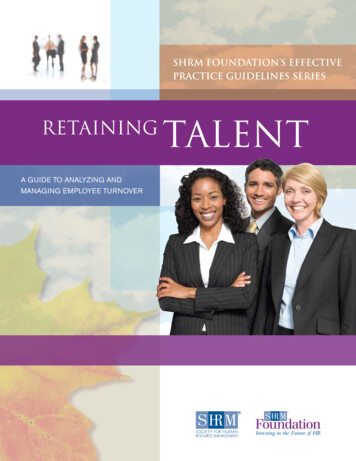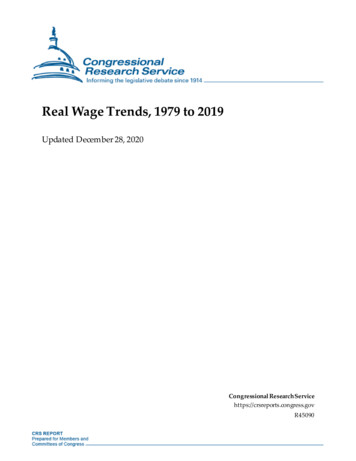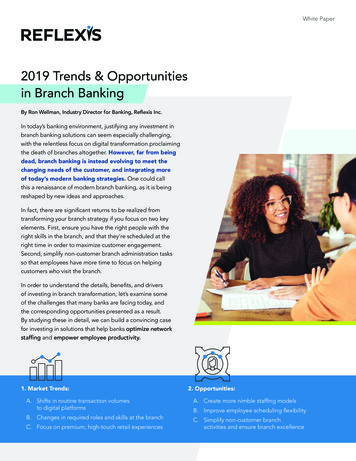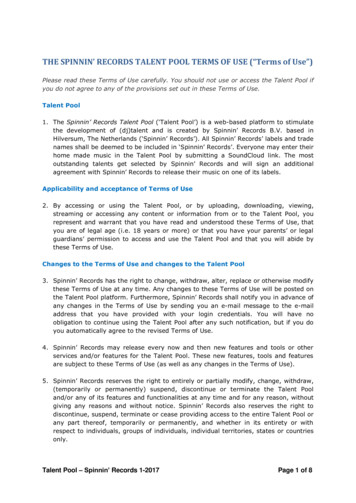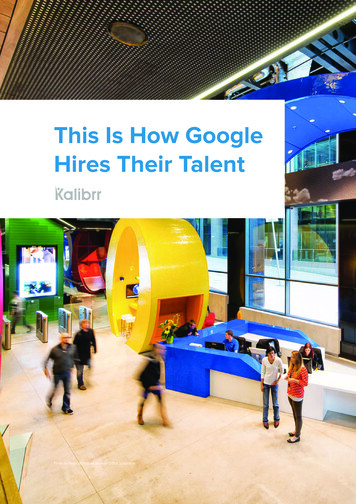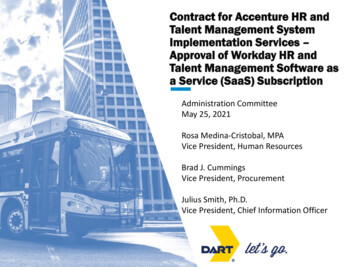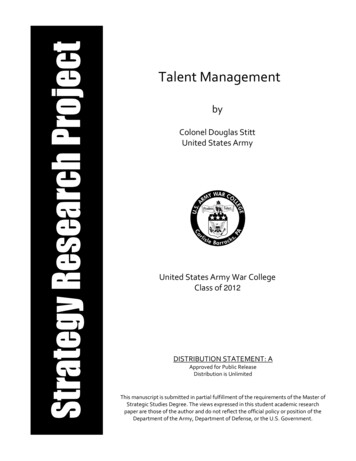
Transcription
2019 TALENTTRENDS GUIDEAs 2019 approaches, what trends willhave the greatest impact on talentin the insurance industry? Is yourorganization prepared?
2019 INSURANCE TALENT TRENDSMORE INDUSTRY INSIGHTSTOP TALENT TRENDSPage 2Insurers Revisit Recruiting and Hiring Practices AmidstCandidate-Driven MarketPage 4Salaries Reevaluated as Talent Market Competition Heats UpPage 6Talent Management Strategies Broadened as TemporaryWorkforce Continues to GrowPage 8Future of Work Dependent On “Human Skills”“The workplace ofthe future requiresleaders who can offera sense of stability andmotivation to theiremployees.”Page 10Page 10Evolving Industry Demands New Type of LeaderPage 12Modernization Draws Attention to Retention StrategiesPage 14Culture Seen as Long-Lasting Solution to Employee Benefits FocusPage 16Emphasis on Diversity Influences Recruitment PlansPage 18Human Resources Embraces Potential of Marketing
2019 INSURANCE TALENT TRENDSMORE INDUSTRY INSIGHTSINSURERS REVISIT RECRUITINGAND HIRING PRACTICES AMIDSTCANDIDATE-DRIVEN MARKETby David E. Coons, Senior Vice President, The Jacobson GroupGone are the days when employers had an upper hand in hiring and staffing. To stay competitive,insurers need to quickly adapt to the new recruitment norm. With more openings than potentialprofessionals to fill them, it’s now a candidate’s market—and a highly passive one as well. Aslow unemployment and rising retirement continues, traditional recruitment strategies must bereevaluated and expectations must be recalibrated. Competition for top talent is fierce. Findingcandidates with the exact blend of skills, experience and competencies required, who are willing tomake a move, is now a monumental challenge.In today’s competitive recruiting climate, position requirements must be revisited. Hiring managersshould consider what transferable experience might be appropriate and which skills and knowledgecan be learned on the job. Culture fit and alignment with the company values are non-negotiable,of course. Considering non-traditional candidates opens the doors to diversity of thought andperspective. Another way to expand the talent pool is to eliminate geographical boundaries. Thevirtual workforce is gaining in popularity and opts candidates in who otherwise would have beenineligible due to relocation restraints.Organizations must accelerate their hiring processes to avoid losing quality candidates tocompetitors who act more quickly and decisively. Offering more competitive base salaries andcompensation packages that also include attractive benefits makes it more enticing for topcandidates to consider changing employers.The insurance industry unemployment rate was down to just 1.2% in November.63% of insurers plan to increase their staff sizes in the next 12 months.2Source: Bureau of Labor Statistics, The Jacobson Group and Ward GroupKey TakeawayA candidate’s market requires insurers to creatively reexaminetheir recruiting and hiring practices in order to expand theirtalent pools and appeal to the top talent needed to succeed.
2019 INSURANCE TALENT TRENDSMORE INDUSTRY INSIGHTSSALARIES REEVALUATED AS TALENTMARKET COMPETITION HEATS UPby Gregory P. Jacobson, co-CEO of The Jacobson GroupReevaluating salary levels has become imperative to recruiting and retaining top talent.Real wages have remained relatively unchanged despite decreasing unemploymentrates and the resulting candidate’s market. The number of candidates open toemployment changes for higher salaries continues to grow. Yet many insurers arestill not prepared to compete. Offers of seemingly lateral compensation are simplynot enough to attract talented candidates.Insurers should be prepared to pay salaries high enough to entice passive, contentprofessionals to leave their current jobs and join a new organization. Attractivecompensation also encourages employees to stay in their positions rather thanjob-hopping to increase their take-home pay. To balance expectations of those inthe current workforce, smart companies are evaluating their overall compensationpackages to compete not only with their peer group but with the greater economy. As anemployer, monetarily valuing employees is a decisive tool to ensure your organizationstands out in the war for talent. Only insurers willing to offer enticing salaries have achance to stay ahead of the talent crisis and outperform the competition.Key TakeawayInsurers must revisit their compensation plans togain a competitive position in the talent marketplace.4Average hourly earnings only increased by22 cents for the insurance industry fromOctober 2017 to October 2018, compared to82 cents for the general economy.37% of employeesare searchingfor the next jobopportunity.Source: Workplace Diversity, Bureau of Labor Statistics
2019 INSURANCE TALENT TRENDSMORE INDUSTRY INSIGHTSTALENT MANAGEMENT STRATEGIESBROADENED AS TEMPORARYWORKFORCE CONTINUES TO GROWby Abbe Sodikoff, Senior Vice President, The Jacobson GroupForward-thinking insurers understand the need to refine talent management strategiesto capitalize on the contract workforce. After rebounding from the economic downturn,organizations have continued to embrace a “run lean” staffing strategy. Insurers continue torely on interim talent in times of sudden work influxes to maintain operations at a fractionof the cost of maintaining a larger permanent staff. Carriers have also sought to bridge theirinternal knowledge or capacity gaps by hiring subject matter experts for special projects. Withinsurers expecting to continue increasing their use of temporary staff, the gig economy ishere to stay. Insurance leaders are now tasked with overseeing a blended workforce of gigworkers and permanent employees; and it is essential they address this new reality in order tomaximize the impact of temporary hires.A successful talent management strategy today includes the temporary workforce within itsscope. Offering competitive salaries and benefits is a must, but leaders need to look beyondthat to the employee experience. Managers should make a conscious effort to fully integratecontract employees within their teams. Temporary employees are likely to perform betterwhen fully immersed in the organization and treated comparably to permanent employees.Embracing the contract workforce and providing a positive experience drives employeerecommendations and positive employer reviews and increases the likelihood of talentedindividuals returning for another project.Key Takeaway13% of insurers expect to increase temporary staff in the next 12 months,up from 9% just three years ago.Only 16% of employers have established policies and practices to managea variety of types of workers.6Source: The Jacobson Group and Ward Group, DeloitteUnderstanding the value of a seamlessly blended workforceand making it a reality organization-wide yields endlessbenefits in terms of productivity and innovation.
2019 INSURANCE TALENT TRENDSMORE INDUSTRY INSIGHTSFUTURE OF WORK DEPENDENTON “HUMAN SKILLS”By Margaret Resce Milkint, Managing Partner , The Jacobson GroupAs technology’s influence explodes, the insurance industry continues to transformbefore our eyes. Today’s augmented workforce boasts robots and humans workingside by side. The reimagining of work we are experiencing cries out for fresh talent withwell-honed emotional intelligence and expertise broader than technical know-how.This evolving reality ignites a need for “soft skills” that only humans can possess. Enterthe birth and the business legitimacy of “human skills.” The future of work demandsinsurance professionals work closely with core organizational values, demonstrateagile leadership, and seamlessly interact with clients and customers. The ability toexert influence, collaborate as a community, and tell stories with empathy and hearthave come to light as competitive and professional differentiators.Refining and celebrating employees’ human skills will be critical for insurers lookingto stay competitive in the marketplace. Strong work ethic, confidence, curiosity andcreativity can improve collaboration and positively influence enterprise performance.Networking, storytelling and empathizing help employees better understand oneanother, drive innovation and ultimately gain return on investment. Organizationsshould interview for and evaluate these human skills, and offer customized, individualtraining plans to help employees adapt to newly defined roles, relationships andbusiness realities. Leaders of today and tomorrow must leverage these competenciesKey Takeaway“Human skills” and emotional intelligence willbecome a critical differentiator for career success.to propel emotional engagement and to drive business impact.93% of employers believe94% of recruiters believe professionals with strongsoft skills are either an“essential” or “very important”factor in hiring decisions.soft skills have a better chance of being promotedto a leadership position than an employee withmore years of experience but weaker soft skills.Source: Wonderlic, iCIMS8
2019 INSURANCE TALENT TRENDSMORE INDUSTRY INSIGHTSEVOLVING INDUSTRY DEMANDSA NEW TYPE OF LEADERCatherine Prete, Senior Vice President of Operations, The Jacobson GroupTomorrow’s business reality is full of uncertainty, volatility, complexity andambiguity. Technological developments, demographic shifts and many morechallenges continue to disrupt the industry; and the pace of change is onlyexpected to intensify. As a result, leading organizations understand the need fora new type of leader to head enterprise initiatives, manage change and inspirecreativity. The workplace of the future requires leaders who can offer a sense ofstability and motivation to their employees.As automation and other technological developments redefine professionals’ jobresponsibilities, effective leaders must be empathetic, honest and approachable,including team members in the modernization process and allowing their voicesto be heard. Furthermore, the ability to effectively influence, persuade, coachand encourage others can help leaders connect their employees to enterprisevalues and goals and to incite the courage and motivation needed to innovate andoutperform. It is important that organizational leaders step forward and lead inthe ways business schools do not teach.1085% of employees believe empathy is often undervalued by their employers.Key Takeaway41% of executives expect future leaders to empower their employees.The future of work requires a different kind of leader, one who can courageouslyand effectively navigate their teams through the challenges and changes thetransforming industry presents and ultimately inspire continued success.Source: Businessolver, Business Insider
2019 INSURANCE TALENT TRENDSMORE INDUSTRY INSIGHTSMODERNIZATION DRAWS ATTENTIONTO RETENTION STRATEGIESby Brad Whatley, Senior Vice President, The Jacobson GroupWhile innovation and the future of work certainly present a promising outlook forthe industry and its professionals, insurers often find it challenging to motivate andretain employees during times of change. It can prove troublesome for leaders tomotivate their employees for projects that may reduce headcount and adverselyimpact their job security. Employees are concerned their leaders are painting thepicture of a future work reality without them. Semantics are important. A spotlightmust be put on how transformation creates promising opportunities for the industry,its workforce and its customers. Transparency and open communication regardingupcoming modernization initiatives are essential.However, insurers need to do much more if they want to retain talent throughoutcompany-wide transformations. While artificial intelligence and data analytics mayindeed replace some job tasks, they will simultaneously create new opportunities.Organizations should carefully evaluate their employees’ transferable skill setsand areas for development and offer programs to support internal mobility andto help employees seamlessly transition into the new reality. At the same time,insurers can sponsor employee participation in technology and analytics eventsto empower employees to exert leadership, network and apply expertise withintheir organizations.Key TakeawayInsurers must focus on retaining and training theircurrent employees to stay ahead in the innovation game.12Two-thirds of employees want honestdiscussions with their employers aboutimplementing artificial intelligence intheir workplaces.The cost to replace ahighly-trained employeecan exceed 200% oftheir annual salary.Source: Center for American Progress, Workforce Institute
2019 INSURANCE TALENT TRENDSMORE INDUSTRY INSIGHTSCULTURE SEEN AS LONGLASTING SOLUTION TO EMPLOYEEBENEFITS FOCUSby Judy Busby, Senior Vice President of Executive Search and Corporate Strategy,The Jacobson GroupFacing a fierce recruitment reality, the focus today is on providing creativebenefits to quickly meet increasing employee demands and improveretention rates. For example, some insurers are beginning to move beyondphysical office presence and a rigid workday schedule to allow employeesto achieve better work-life balance and to expand their talent pools. Othersare offering tuition reimbursement and student loan repayment programs,among other innovative perks.However, such creative benefits are not an end-to-end solution. Lastingemployee retention and positive employer brand are the result of anintentional and well-aligned corporate culture. A strategic and holisticapproach to workplace culture starts with a company’s mission, vision andvalues and culminates with more tangible features like individual benefits.Corporate culture that is built with company goals in mind and supportsemployees’ desires and motivations can help insurers realize future success.37% of employees think their organizations should make effortsto change enterprise culture to ensure a good work-life balance.88% of employees said company culture was at
A successful talent management strategy today includes the temporary workforce within its scope. Offering competitive salaries and benefits is a must, but leaders need to look beyond that to the employee experience. Managers should make a conscious effort to fully integrate contract employees within their teams. Temporary employees are likely to perform better when fully immersed in the .
